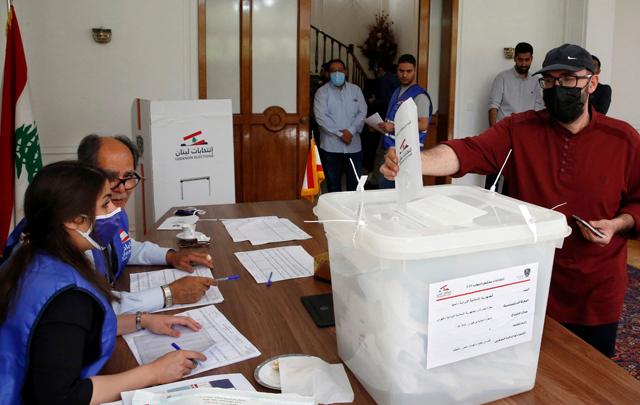by naharnet.com — Maronite Patriarch Beshara al-Rahi on Sunday lauded “the role of the government, the concerned ministers and the employees of …

BEIRUT, (Reuters) - More than 100,000 Lebanese living abroad cast ballots for parliamentary electionson Friday and Sunday, many backing political newcomers after the worst crisis since Lebanon's 1975-90 civil war led to widespread poverty and a wave of emigration. Some225,000 Lebanese living overseas were eligible to participate in the elections in more than 50 countries, the first since Lebanon's 2019 financial collapse and the port blast that killed more than 215 people and destroyed large parts of Beirut in August, 2020. Overall turnout in overseas voting was around 60%, foreign ministry official Hadi Hachem told Reuters, or some 130,000 people. That is roughly three times as many as during the last polls, in 2018.
Observers expect large numbers of expatriates to vote for candidates from a coalition of activists and independents who gained prominence during 2019 protests against the sectarian political elites whose corruption and mismanagement is widely blamed for the country's catastrophic collapse. "I want change," said Samer Sobbi, a truck driver voting in Sydney on Sunday. "I don't want the same people, the same people every four years, and if not the same people then their kids, if not their kids, their relatives. What about us?" Australia is among those countries with the highest number of Diaspora voters, alongside Canada, the United States, Germany, the United Arab Emirates. France has the most at around 28,000 eligible voters.
Turnout in Australia closed at 55%, while in the UAE more than 70% of eligible voters cast their ballots, one of the highest turnouts registered. The queue outside the Lebanese consulate in Dubai stretched for roughly a kilometre despite sweltering heat, and local police were seen fanning voters with pieces of cardboard. "I came today just to vote and don’t care how long we wait in the heat. We need change," said first-time voter Christiane Daou, 37.

By AFP -- Beirut — Lebanese expatriates on Friday voted in parliamentary polls, kickstarting a critical election that comes amid an unprecedented financial crisis that has spurred a mass population exodus. While opposition figures have pinned their hopes on the diaspora, experts said the elections were expected to uphold the status quo, despite years of economic meltdown. Expatriates in nine Arab countries and in Iran cast their votes on Friday, with Syria and Tehran seeing the highest turnout rates, according to Foreign Affairs Minister Abdallah Bou Habib.
Bou Habib said nearly 60 per cent of the 30,930 voters registered overseas had cast a ballot, a jump from 56 per cent in 2018. The foreign minister had expressed hope for 70 per cent participation earlier Friday but the final count announced after ballots closed was estimated at 18,225 votes. Expatriates in 48 other countries will vote on Sunday. On Saturday morning, two boxes carrying expat votes arrived at the Beirut airport from Tehran, escorted by Lebanon's envoy to the Islamic Republic, the official National News Agency reported. All other ballots will be delivered to Lebanon by logistics giant DHL, with the exception of those from neighbouring Syria which will be handed over across the border, Bou Habib said.
'Vote in large numbers'
It is the second time in Lebanon's history that citizens residing abroad are able to vote for their 128 representatives, in elections set to be held at home on May 15. The vote is the first since mass protests erupted in late 2019 against the country's entrenched ruling elite, widely blamed for the economic collapse. Bou Habib had said that Lebanese based abroad would be able to vote in more than 205 polling stations worldwide. The number of Lebanese who have registered to vote abroad has climbed from the roughly 92,000 in 2018 elections, though only 50,000 of them voted at the time. But voter registration, while on the rise, remains relatively low among the millions of Lebanese who live abroad, and their descendants.

سجعان قزي
@AzziSejean
هل يَنحصِرُ تأثيرُ الانتخاباتِ النيابيّةِ هذه المرّة على النظامِ اللبنانيِّ أم يَمتدُّ إلى الكيانِ اللبناني؟ في الدولِ الديمقراطيِّة المكتَمِلةِ التكوينِ الوطنيِّ يَقتصِرُ تأثيرُ الانتخاباتِ على تداولِ السلطةِ بين الأكثريّةِ والأقليّة، ولا يَطالُ النظامَ ولا الكيان. هكذا كانت الحالُ في لبنان حتى انتخاباتِ 1992 التي انعكسَت على النظامِ بوجْهَيه الدستوريِّ والميثاقيّ، وانتخاباتِ هذه السنةِ، 2022، التي ستَنعكِسُ حتمًا على النظامِ، وربما على الكِيان. فلا نَدَعِ الحملاتِ الانتخابيّةَ الفائضةَ والبرامجَ الشعبويّةَ المدَبْلَجةَ تَخدَعُنا وتُبعِدُنا عن جوهرِ الاستحقاقِ الانتخابيّ.
Khazen History


Historical Feature:
Churches and Monasteries of the Khazen family

St. Anthony of Padua Church in Ballouneh
Mar Abda Church in Bakaatit Kanaan
Saint Michael Church in Bkaatouta
Saint Therese Church in Qolayaat
Saint Simeon Stylites (مار سمعان العامودي) Church In Ajaltoun
Virgin Mary Church (سيدة المعونات) in Sheilé
Assumption of Mary Church in Ballouneh
1 - The sword of the Maronite Prince
2 - LES KHAZEN CONSULS DE FRANCE
3 - LES MARONITES & LES KHAZEN
4 - LES MAAN & LES KHAZEN
5 - ORIGINE DE LA FAMILLE
Population Movements to Keserwan - The Khazens and The Maans
ما جاء عن الثورة في المقاطعة الكسروانية
ثورة أهالي كسروان على المشايخ الخوازنة وأسبابها
Origins of the "Prince of Maronite" Title
Growing diversity: the Khazin sheiks and the clergy in the first decades of the 18th century
Historical Members:
Barbar Beik El Khazen [English]
Patriach Toubia Kaiss El Khazen(Biography & Life Part1 Part2) (Arabic)
Patriach Youssef Dargham El Khazen (Cont'd)
Cheikh Bishara Jafal El Khazen
Patriarch Youssef Raji El Khazen
The Martyrs Cheikh Philippe & Cheikh Farid El Khazen
Cheikh Nawfal El Khazen (Consul De France)
Cheikh Hossun El Khazen (Consul De France)
Cheikh Abou-Nawfal El Khazen (Consul De France)
Cheikh Francis Abee Nader & his son Yousef
Cheikh Abou-Kanso El Khazen (Consul De France)
Cheikh Abou Nader El Khazen
Cheikh Chafic El Khazen
Cheikh Keserwan El Khazen
Cheikh Serhal El Khazen [English]
Cheikh Rafiq El Khazen [English]
Cheikh Hanna El Khazen
Cheikha Arzi El Khazen
Marie El Khazen